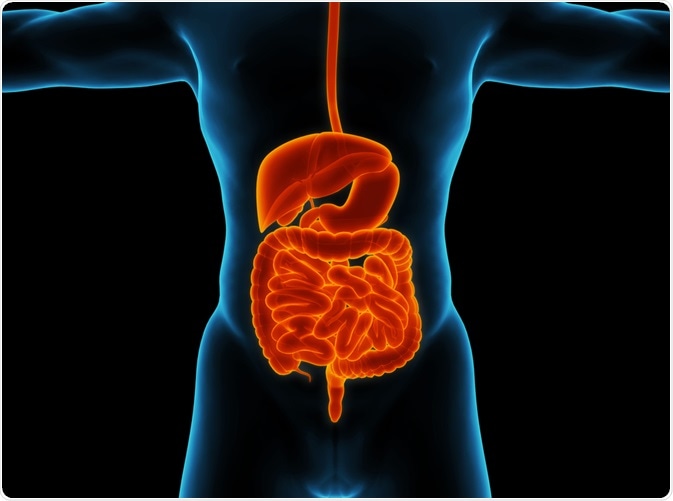The novel severe acute respiratory virus (SARS-COV-2), responsible for the ongoing coronavirus pandemic, is primarily known for its ability to wreak havoc on the respiratory systems of infected individuals. In addition to this, various gastrointestinal (GI) symptoms have been identified in subsets of affected patients.

Image Credit: Magic3D/Shutterstock.com
GI symptoms of COVID-19
Coronavirus disease 2019 (COVID-19) is known to cause many symptoms within infected individuals, ranging from asymptomatic presentations to critical forms of the disease that can lead to respiratory failure, shock, or multiorgan dysfunction. Typically, the GI manifestations of COVID-19 were often associated with those who also exhibited respiratory symptoms.
The prevalence of GI symptoms at diagnosis of COVID-19 varies greatly, with reports ranging from 2% to 57% of patients experiencing GI complications because of this infection. The most commonly reported symptom is diarrhea; vomiting, nausea, loss of appetite, loss of taste, and abdominal pain are also observed. Notably, COVID-19 patients who experienced GI symptoms reported significantly higher rates of fever, fatigue, shortness of breath, and headaches.
ACE2 in the GI tract
Several studies have confirmed that the primary target protein of COVID-19 is the angiotensin-converting enzyme 2 (ACE2). Although ACE2 is predominantly expressed in the respiratory tract lining of the alveolar epithelial cells, it is also highly expressed in various types of GI cells.
In a recent study investigating the expression patterns of ACE2 across over 150 different cell types, researchers found that ACE2 expression was highest in enterocytes, commonly found in the small intestine, colon, and duodenum. These investigations indicate that levels of ACE2 expression in colonic enterocytes can be up to 100-fold higher when compared to those present in the respiratory tract.
Intestines
Similar to how COVID-19 enters the respiratory system, virus particles enter cells of the GI tract through the ACE2 receptor. This interaction may disrupt the barrier function of these organs, particularly by altering the role of various barrier proteins, including ZO-1, occluding, and claudins.
Disrupting the barrier function allows COVID-19 to induce a series of inflammatory responses. These are categorized by the release of both chemokines and cytokines, alongside the infiltration of neutrophils, macrophages, and T cells to the infected area. Some of the different effects of cytokine production within the GI tract include:
- Dysbiosis
- Exacerbation of intestinal inflammation
- Damage to the intestinal mucosal barrier
How your digestive system works - Emma Bryce
Liver
Within the liver, cholangiocytes, which are the epithelial cells of the bile duct, also express ACE2. Previous studies have indicated that ACE2 appears to protect the liver against inflammation, as the deletion of this protein aggravates hepatic steatosis, oxidative stress, and inflammation in the liver. Therefore, the reduced expression of ACE2 due to infection by COVID-19 can lead to liver dysfunction, particularly in patients with co-morbid liver disease.
To date, several COVID-19 patients have exhibited liver impairment indicated by hypoalbuminemia, prolonged prothrombin time, and hyperferritinemia. An increase in the expression of several liver dysfunction biomarkers like aspartate transaminase (AST), alanine aminotransferase (ALT), gamma-glutamyl transferase (GGT), and alkaline phosphatase (ALP) are additional indicators.
Overall, there remains a lack of information elucidating the exact mechanisms by which liver injury occurs in COVID-19 patients. Researchers speculate that liver dysfunction is triggered by direct or secondary infection due to prior liver injury or drug-mediated hepatotoxicity; however, further studies are required to confirm this hypothesis.
Pancreas
ACE2 also appears to have a protective role in the pancreas by increasing the levels of pro-inflammatory biomarkers interleukin-6 (IL-6) and IL-8 levels while also promoting levels of the IL-10 cytokine, which has anti-inflammatory capabilities.
The presence of ACE2 in both the exocrine glands and islet cells of the pancreas suggests that COVID-19 can feasibly enter the pancreas. More specifically, studies have found that upon entry into the pancreas, COVID-19 can disrupt both glucose metabolism and ß-cell functioning. COVID-19 induced pancreas dysfunction has been demonstrated in a subset of patients who exhibited elevated serum amylase and lipases levels.
Management
Following COVID-19 diagnosis, the treating clinician should carefully review whether the patient has any co-existing GI disorders and confirm whether there might be other causes of their GI symptoms. When COVID-19 appears to be the leading cause of a patient’s GI symptoms, the primary treatment option has been supportive care.
For example, treatment for severe diarrhea involves the intravenous administration of fluids and serum electrolytes. Comparatively, COVID-19 patients suffering from severe nausea and vomiting are treated with parenteral antiemetics, such as metoclopramide, ondansetron, or prochlorperazine. Overall, no specific guidelines have been published on how to treat COVID-19 associated GI symptoms.
References
- Pola, A., Murthy, K. S., & Santhekadur, P. K. (2021). COVID-19 and gastrointestinal system: A brief review. Biomedical Journal. doi:10.1016/j.bj.2021.01.001.
- Zhang, J., Garrett, S., & Sun, J. (2021). Gastrointestinal symptoms, pathophysiology, and treatment in COVID-19. Genes & Disease 8(4); 385-400. doi:10.1016/j.gendis.2020.08.013.
- Vespa, E., Pugliese, N., Colapietro, F., & Aghemo, A. (2021). Stay (GI) Healthy: COVID-19 and Gastrointestinal Manifestations. Techniques and Innovations in Gastrointestinal Endoscopy 23(2); 179-189. doi:10.1016/j.tige.2021.01.006.
Further Reading
Last Updated: Aug 4, 2021